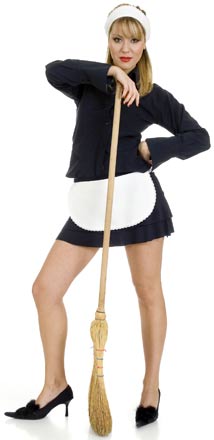1. More proof that I am not "anti-nurse"
2. Doctors' dining rooms: the ultimate in exclusivity
by Kevin Pezzi, MD

How some doctors view nurses
Over the years, a few nurses have accused me of being "anti-nurse." Those accusations came from nurses who read part of my www.ERbook.net site, but not everything I said in it. Had they done that, they would have read "pro-nurse" sentiments, too, such as one I posted on this site.
The people who made that accusation apparently think that someone is "anti-nurse" if he criticizes bad nurses or nursing behavior. In this site, I posted my response to an ICU nurse who disagreed with my portrayal of nurses. That varies from negative to positive depending on whether I am discussing bad nurses/nursing behavior, or good nurses/nursing behavior.
This nurse seemed oblivious to a fact that almost everyone knows: something is much more likely to be newsworthy when a mistake or accident occurs than when everything goes as planned. If a mother takes her kids to the mall and returns uneventfully, it isn't newsworthy. You won't hear about it on the evening news, nor read about it in the newspaper. However, if she and her children were killed by a speeding drunk driver, it is newsworthy. Similarly, there is nothing newsworthy about a routine healthcare case in which no mistakes were made, but it is newsworthy when a young patient is killed by receiving the wrong blood transfusion (which just happened, by the way).

Some nurses are a joy to work with
I thought the ICU nurse was totally off base for trying to squelch any criticism of nurses. Notably, I only denounced bad nurses or nursing behavior that made it more difficult for me to give patients the best possible care. These things should be swept under the rug? I don't think so! In my reply to him, I substantiated my opinions by giving real examples of some things nurses did that were not just wrong but absolutely outrageous. I gave him the opportunity to respond, but he never did. It's difficult to argue with facts.
I have worked with some ER nurses for years and never had a problem with them; they're called good nurses. Conversely, I've worked with other ER nurses who frequently made errors (sometimes several times per shift); they're called bad nurses. In my opinion, the good nurses do not receive nearly as much respect, recognition, and pay as they deserve. However, I think the bad nurses receive more pay than they deserve; if I had my way, they would not be working as nurses!
Clearly, my opinion of any given nurse depends on how well he or she performs at work. However, there are indeed doctors who harbor an anti-nurse conviction. One of the stories on my www.ERlove.com site included a tangent in which I illustrated this anti-nurse sentiment. Here is an excerpt of that:
I pride myself on my lack of ostentation, unlike some physicians. One of my old bosses comes to mind. He once told me not to eat in the same room as “the help.” I quickly learned that “the help” was his term for the nurses, clerks, technicians, and other staff. He explained that physicians were too good to share a meal with these (according to him) lower forms of life. I thought to myself, “What? These people are my friends, and I do not think I am better than them just because I have an MD after my name. He cannot possibly be serious!” But he was serious. His opinion surprised me, because he was a very decent fellow otherwise. Really.
Now that I am discussing ostentation and food in hospitals, I should mention something else that surprises me. Many hospitals have doctors' dining rooms, reserved for—you guessed it—doctors. Besides segregation, some of these doctors' dining rooms serve food equal to that in five-star restaurants. I worked at one hospital where the doctors could have prime rib at every lunch or dinner, while “the help” ate meatloaf or worse in the cafeteria. We ate at fancy tables covered by starched white tablecloths, and were served by chefs wearing toques (chef hats) and waitresses who looked like models. All very courteous, of course, using the word “doctor” so often I was sure they had been instructed to do that. “May I get you anything else, doctor?” “Doctor, is all of the food to your liking?” And the best part? It was free. All ‘cause I have an MD degree.
I loved eating in there so much that I hardly ever did. Oh, the food was superb, the waitresses were stunning, and the gracious treatment was a pleasant change from the profanity hurled my way in the ER. But . . . but I felt uncomfortable being singled out for special treatment just because of my degree. I felt a bit too catered to, if you know what I mean. I felt the segregation was an unjustifiable anachronism. Why couldn't a nurse, tech, or unit clerk walk in there and receive the same food and red-carpet treatment? Aren't they good enough?
Back to the main Question & Answer page
